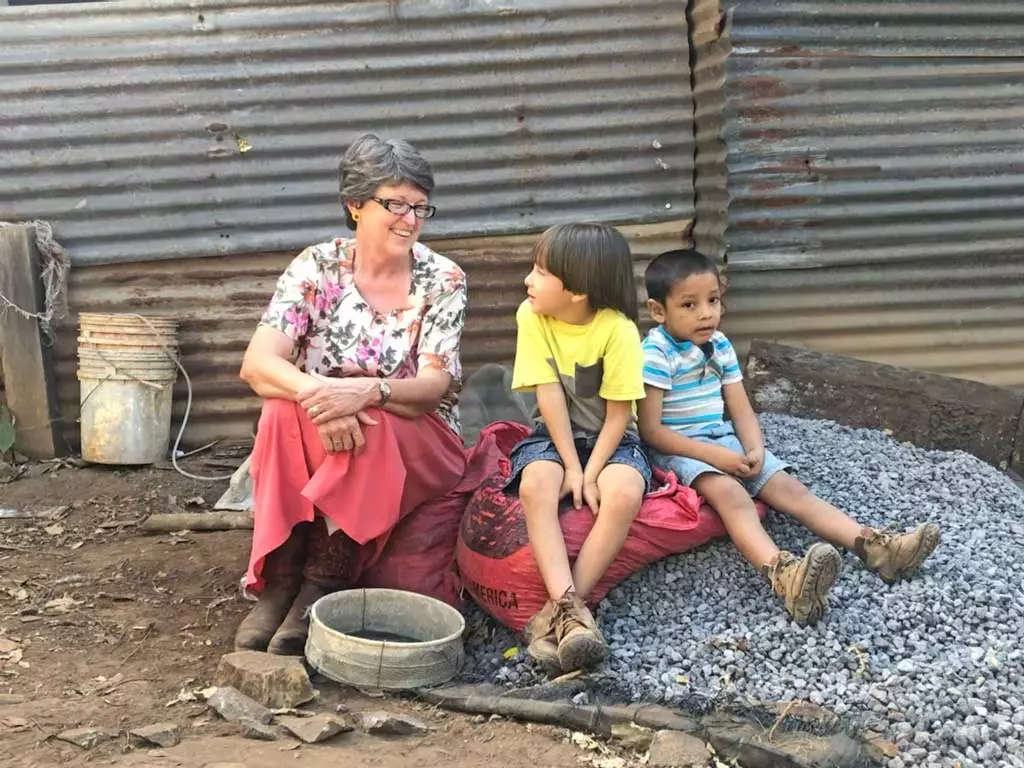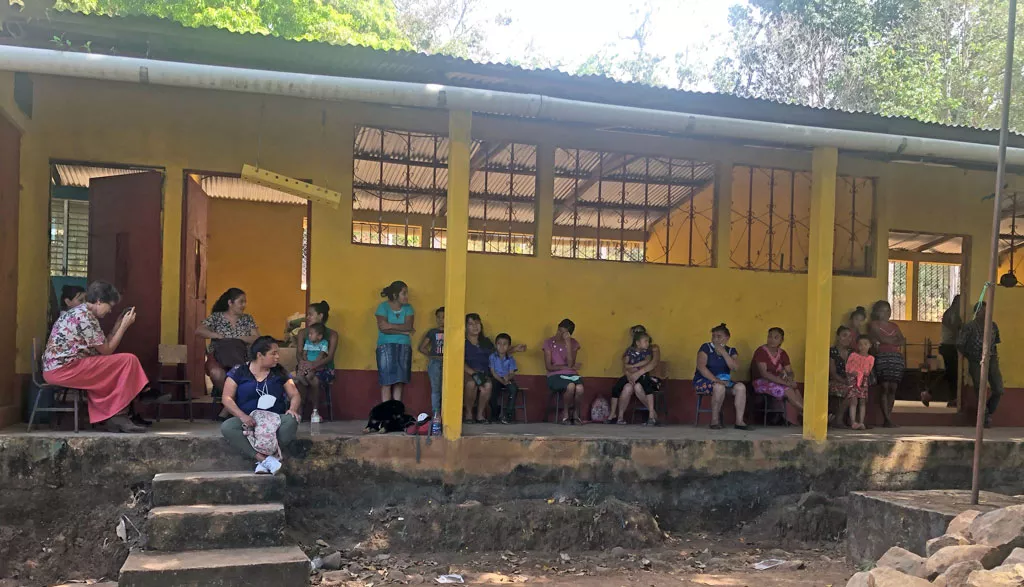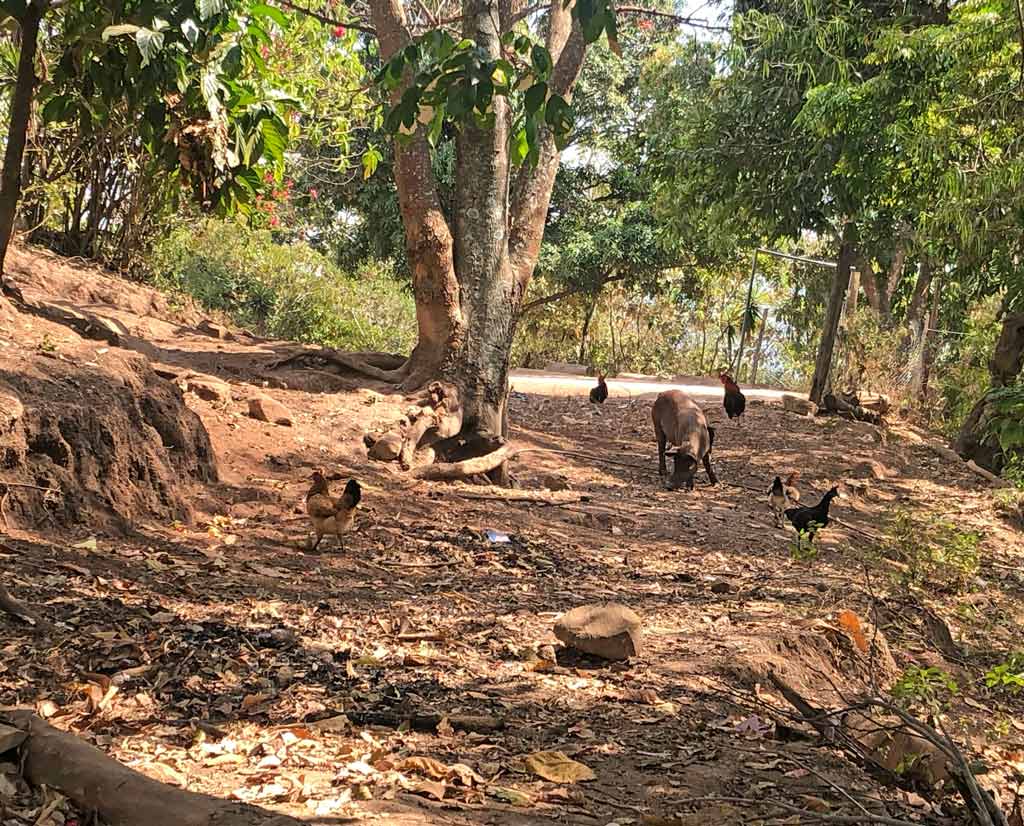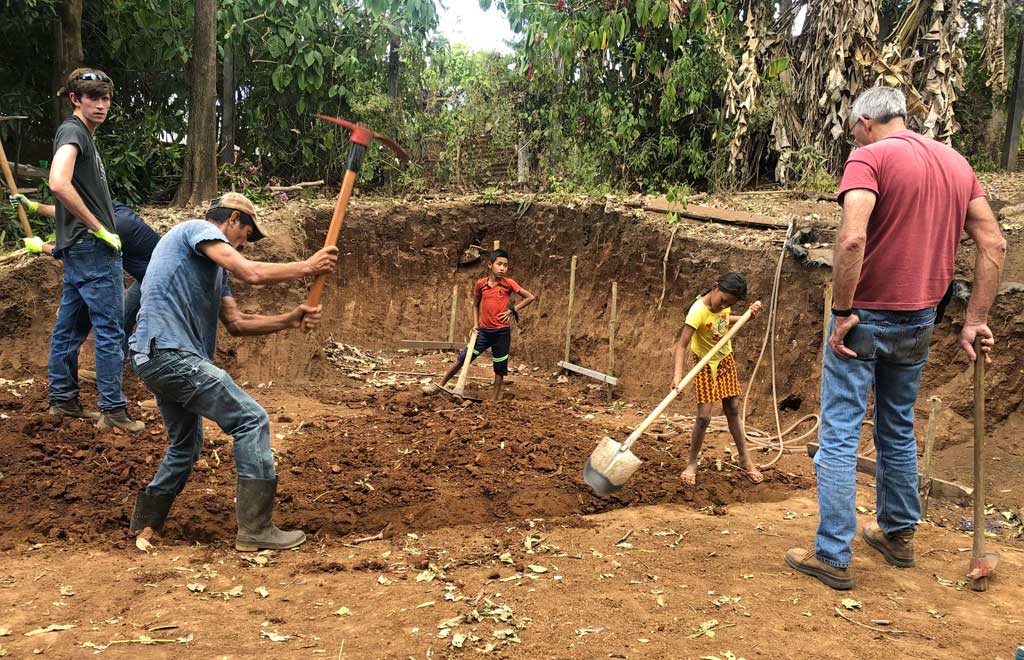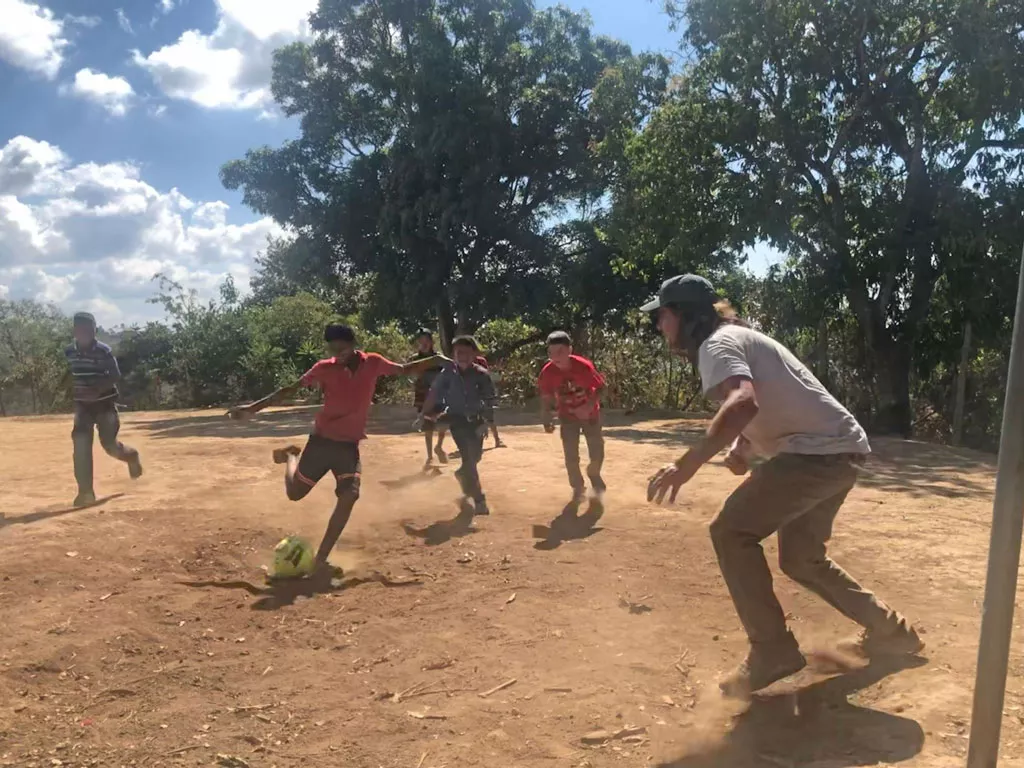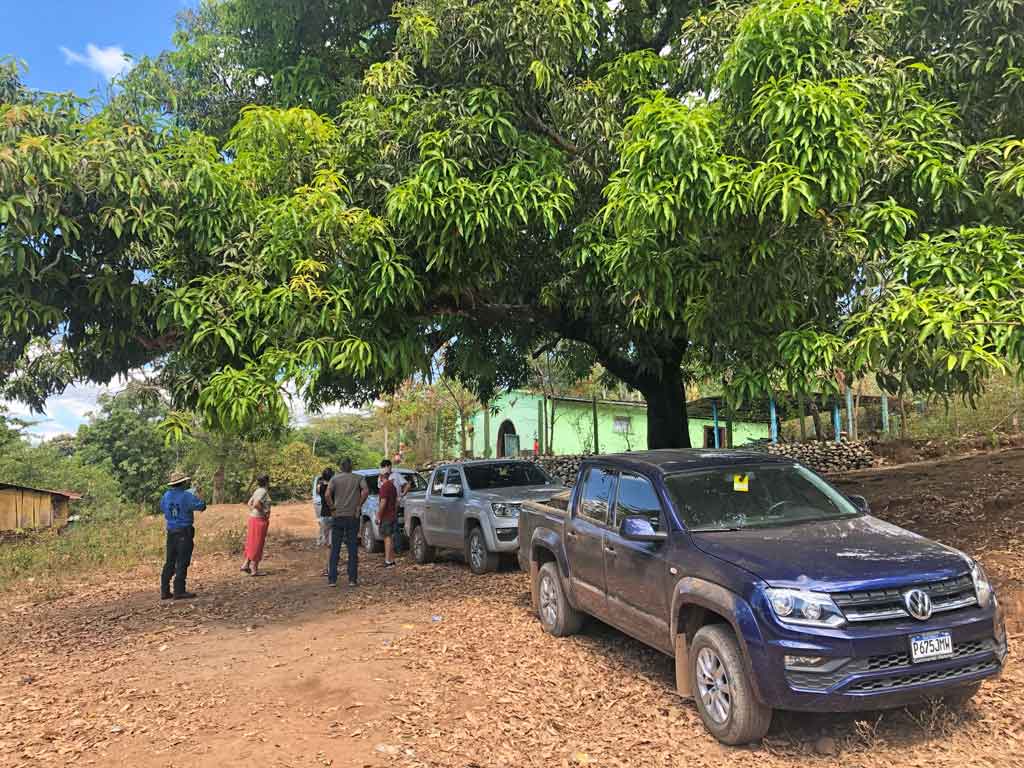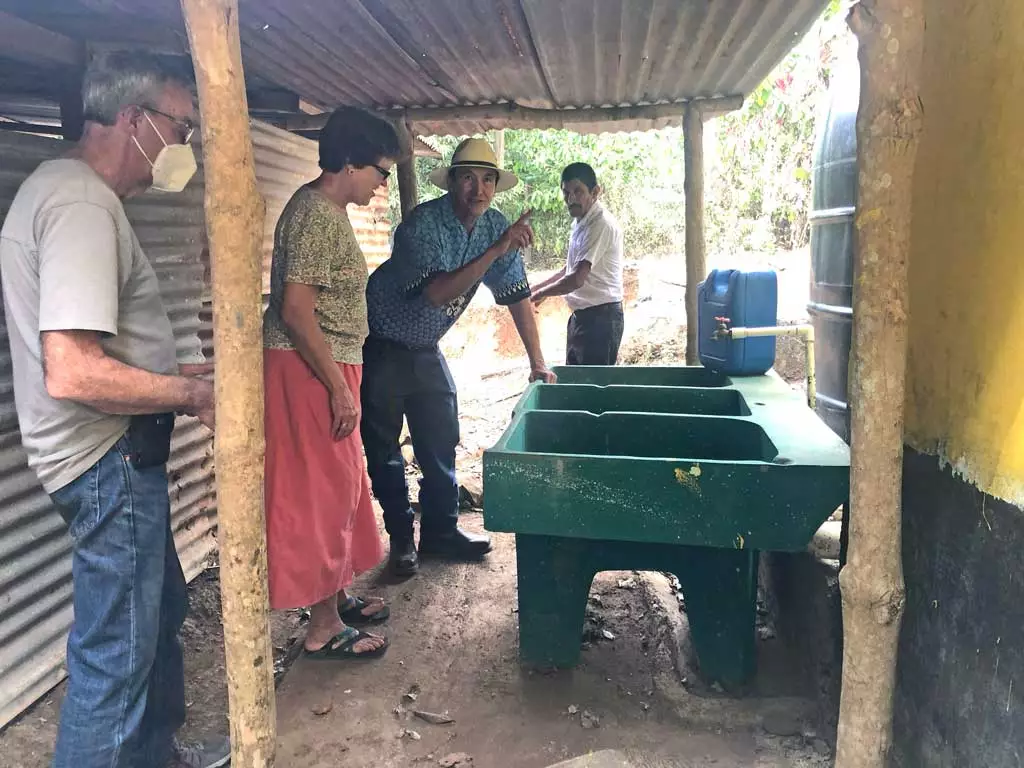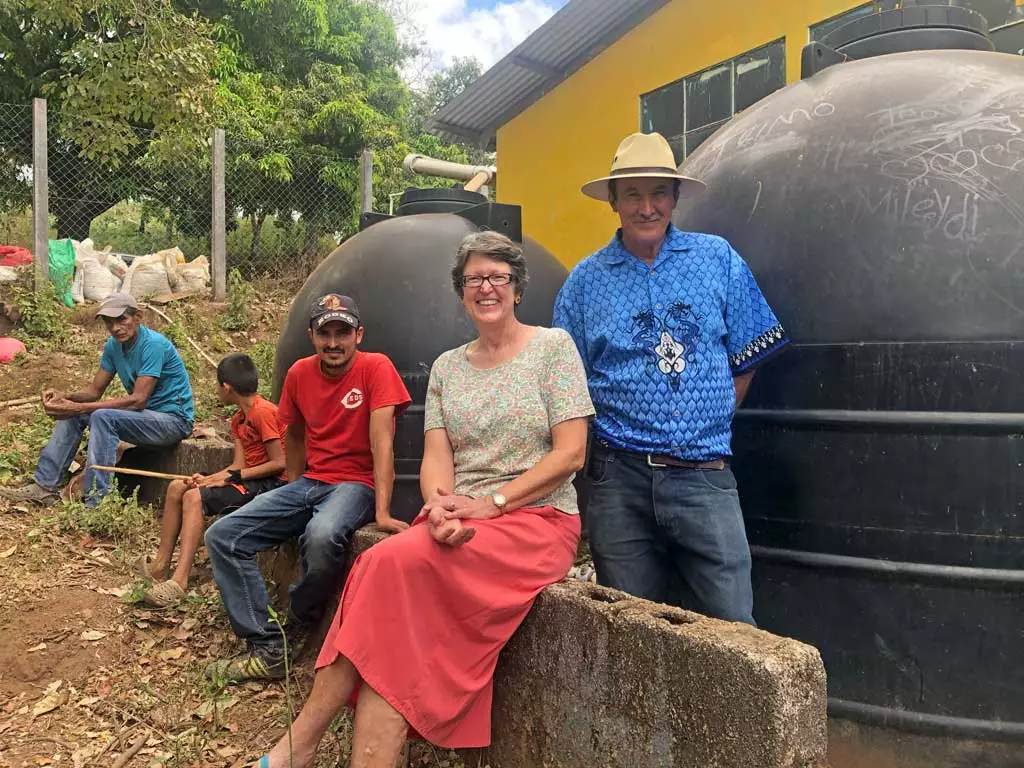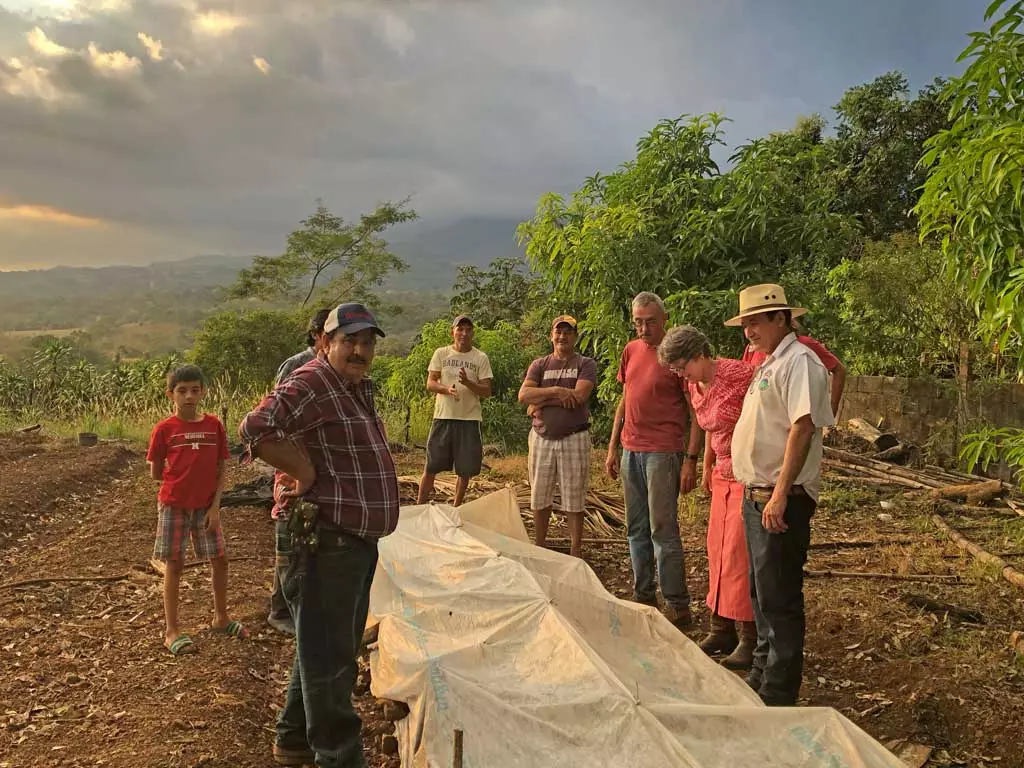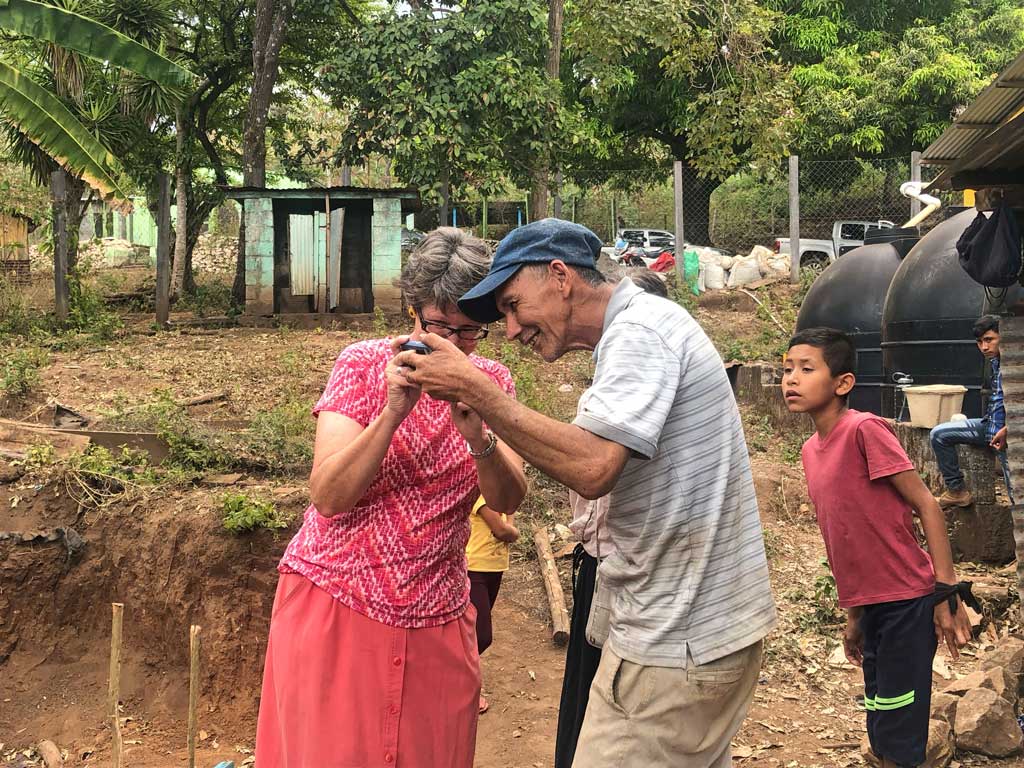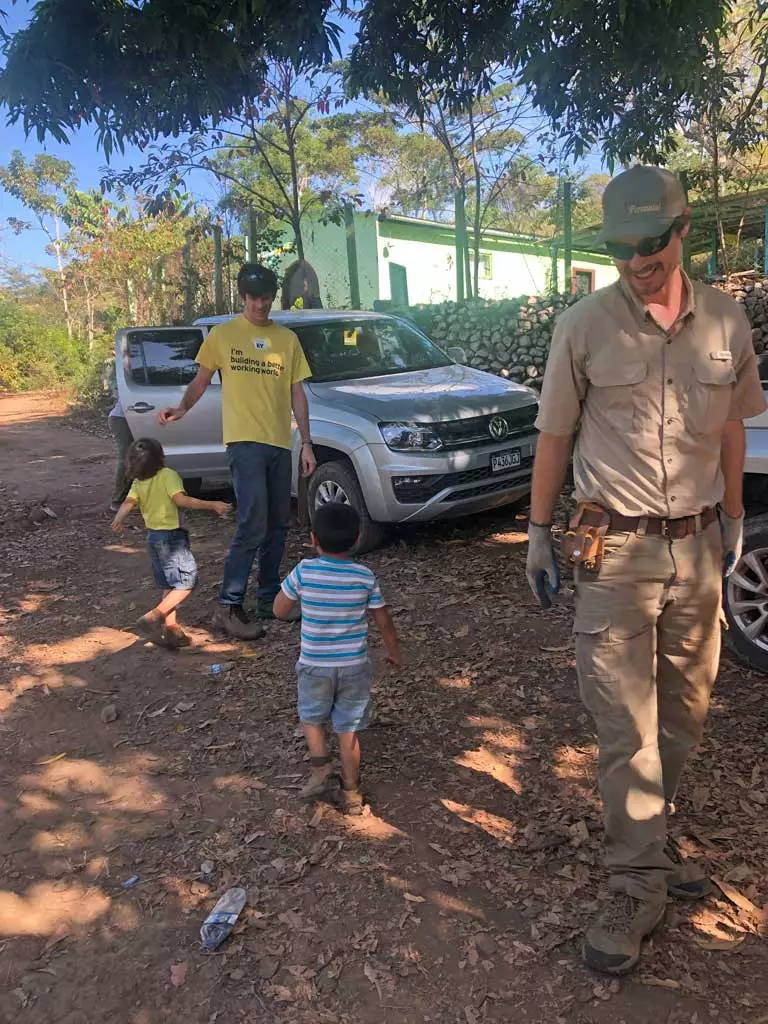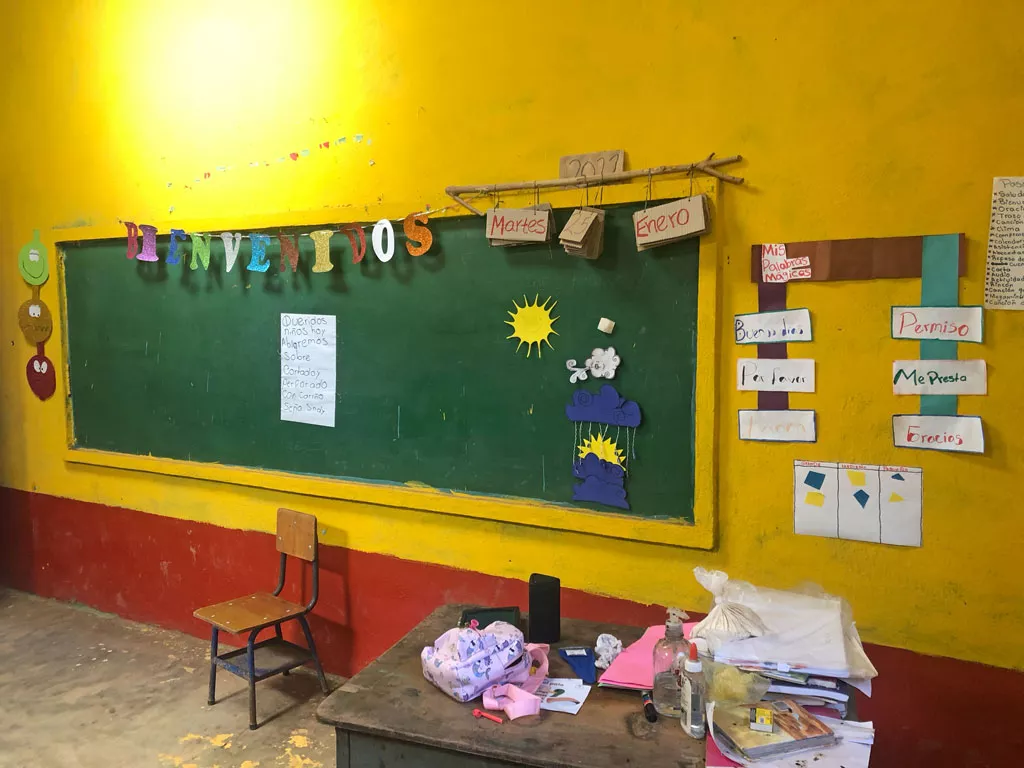Señorita Juanita
Jane Ragsdale delivers hope, healing and friendship to Guatemala
After church service ends on a Sunday morning in late January, villagers flock to Jane Ragsdale, the 65-year old Texas Woman’s University alumna and Hunt resident, her giant smile and ten years of memories a magnet to them all. “I feel the love she has for us,” villager Elvira Lopez Perez says. “She’s always so happy to see us.”
The villagers, a group of 15 or so this morning, patiently wait their turn to give her a hug and catch up. “I have new strings for you,” Jane tells the guitar player in the three-piece church band. After a long embrace with a villager named Jairo, the mayor’s son, she asks by name how his children are doing. Soon enough, she’s showing other villagers pictures of her own son Deen, who they remember from a visit years prior. “He’s grown!”
This is the power of Jane, a great communicator and leader who knows there’s more than one way to skin a cat. She sees the usefulness in everyone, respects cultural differences, but isn’t afraid of them. She is the girl who made her friends stop kicking over the ant hills as a child, the young woman who wanted to transform her guilt into action, the camp director who teaches about the dignity of the people whose hard labor we depend on for our everyday comforts. More than a Christian missionary, more than a Spanish speaking gringa, and more than someone with the means to help this neglected corner of Guatemala, she is a friend. Octaviano Santos, the informal mayor of the village, calls her his great collaborator and is effusive when describing her. “I’m so lucky,” he says, “to have her in my life.”
Cynthi Jane Ragsdale was born in Houston in 1965. Jane, like her father Silas, grew up going to and loving summer camp. Her parents owned Camp Stewart, a boys camp in Hunt, where Silas had been a camper in the ’30s. When she told her parents she wanted to one day run Camp Stewart, they told her not only could a girl not run a boys camp, running a camp was a commitment to a life of hard work and little pay. “They told me I needed to figure something else out.” She would, but as fate would have it, by the time Jane enrolled at Texas Woman’s University in 1975, her parents had purchased Heart O’ the Hills, an all-girls camp where Jane had been a camper and junior counselor for years. By the time she was 30, she’d be running the place, a job she still loves to this day.
When it was time for Jane to decide where to go to college, she knew either way she was going to be extending a family legacy. Two generations of men had attended the University of Texas and two generations of women had been TWU graduates. In the end, she said, TWU just felt like home. “Plus” she says, “I thought I’m not going to school to get my Mrs. Degree, I’m going to get my education.” A lover of music and singing, Jane began her student career as a music major and thought she could be a professional singer. She realized, however, that studying music, she says, took all the fun out of it. Her grandfather had been an editor and she enjoyed writing so she decided to enroll in the journalism program. She also had aspirations of being a foriegn correspondent so she decided to study a second major, this one in Spanish.
Being at TWU emboldened Jane, her attitude shifted to one of a self-sufficient woman, who didn’t need a man to help her do anything. Fixing a flat tire, carrying a heavy box, no matter what it was, she says, her attitude now was that she could get it done. She was also especially proud to boast about the professors she admired to friends who went to different schools. “I’d come home for Christmas and all my buddies and I would get together and we’d talk about our favorite professors and I’d say ‘I love Professor Johnson’ and my friends would say ‘Oh, what’s he like?’” She pauses while telling this story for dramatic effect and scrunches up her face with a sarcastic smile. “I’d say ‘She is great.’”
Jane packed her semesters, taking 18-21 hours to complete her two journalism degrees (she completed one Bachelors of Art and one Bachelors of Science in Journalism) and Spanish degree, never taking summer school because of her commitment to working at Heart O’ the Hills. She remembers a campus forever under construction, the result of President Guinn’s ambitious expansion in the ’70s. Guinn would die Jane’s freshman year, succumbing to a heart attack he experienced at the annual Redbud Pageant, in which Jane attended. “I was right there,” she says, recalling him falling over during the crowing of the queen. Three years later, a stunned Jane would win the title of Redbug Queen herself.
As a journalism major she took 7 a.m. copy editing classes and covered late night open forums in the dorms that needed to be turned around quickly for the morning class. Hoping to not disturb a fussy roommate, Jane sat on the floor in the bathroom of their Guinn dorm room, using the toilet seat as her desktop, typing away her stories on her typewriter. The next morning, “I’d drag my corpse out of bed and run all the way to the journalism building with my story on a scrap of paper. I was famous for not having good paper.”
She spent hours and hours in the journalism building, doing every job imaginable for The Lasso, the student newspaper, which then was published every day. She’d write stories, edit copy, write headlines, develop photos in the dark rooms, attend to the teletype when the alarm bells for big news sounded, and used an exacto knife to paste up the pages back in the analog days of daily news production. The printing press was right on campus, below the now long gone journalism building. When she applied to be the editor of the paper her senior year, she was comforted by her competition. “I wasn’t special because I was an ambitious woman,” she says. “Everyone there was an ambitious woman.”
It didn’t matter. She got the job.
—
Cradled in the ancient lava flow ridges of the Guatemalan Sierra Madre mountains and its accompanying volcanoes is the tiny village of Guayabales. It is one of many small rural communities that dot the side of the mountain. Santos says they have been “abandoned” by the Guatemalan government, and though they pay government taxes, the resources they receive are negligible, due both to political corruption and geographic inconvenience. They farm pineapples and use their ingenuity to survive, though most young people move away for more opportunities.
To get to Guayabales from the United States during a global pandemic is a practice in doing things the hard way and realizing still, things could get worse. A 3-hour flight from Dallas kicks off the trip, though making it through customs in Guatemala will be trying, especially when hauling 20 large plastic tubs of supplies including tools, donations of toys and $1,500 worth of seeds that will eventually be confiscated. Up next is a two and a half hour drive south to Chiquimulilla (Say CHEE-KEY-MOO-LEE-AH), a medium-sized town not unlike those you’d find south of the border from Texas. Finally, as the roads make way to unpaved dirt streets, you begin the hour and a half climb up the mountain – a rough off-road expedition that recalls a popular ice cream flavor, jostling over enormous boulders and negotiating with wild horses and sleeping dogs the entire way. Not quite a jungle and not quite farmland, the stunning views evoke Napa by way of Indiana Jones. It is both wild and familiar.
A giant mango tree that almost reaches out across the entire village welcomes you when you arrive. It is a “downtown” of sorts, the local meeting spot for travelers and locals alike, with enough space under the shade for the rare vehicle who makes the trek. On either side are humble buildings brightly colored: one a lime green church, the other a lemon yellow schoolhouse. Houses made from combinations of old sheets of metal, cinder block, and wood make up the rest of the community with little uniformity while chickens, hogs, and skin-and-bone dogs roam freely. There is no electricity, sewage, or running water.
You don’t have to be Sherlock Holmes to find the evidence of Jane’s endeavors in the community. The villagers step over her name as they enter church, inscribed into the cement steps by the building’s retaining wall she helped build. The children read books that she helped facilitate as donations from the United States, in a school house that she helped fix up. The curtains that shield the sun? Jane helped make those. The skylight, windows, and paintjob? Jane had a hand in all of it. Outside the school, three of the five multi-thousand gallon tanks she helped procure in 2018 feed new sinks water for handwashing – a luxury for the village. In 2020, the last time Jane was in Guatemala due to COVID restrictions, she, along with a team who had completed a "solar school" course in Arkansas, built a shed that houses a filter powered by solar panels they also installed for water purification. In three years, thanks to the efforts of Jane and Let Hope Begin Here, Guatemala, the nonprofit organization she’s officially been coming to Guayabales with for all these years, the village has gone from drinking bacteria-infested water to, what one of the volunteers reckons, is better water than what most Texans are drinking today.
Santos points to all of these projects and more, the pieces of Guayables that are, at least in part, a direct consequence of Jane’s hard work. Dr. Scott Robertson, the Lubbock-based psychologist who founded Let Hope Begin Here, Guatemala 15 years ago, says Jane has become a crucial centerpiece of the operation. “Calling Jane an enormous asset,” he says, “would be an understatement.”
—
When Jane was a child, around 11 or so, she had a nightmare. She was lost and trying to ask for directions, but no one could understand her. Even worse, the people she asked for help gave her dirty looks, taking offense at the gibberish coming out of her mouth. Why couldn’t anyone understand her, she thought. Why was no one trying to understand and help? She awoke and had a realization.
At the time she had been meeting undocumented workers who cleaned and did handy work at her parent’s summer camp, curious as to why they didn’t know which way a book should be shelved or how to make a bed with fitted sheets and shams. “I woke up and realized that’s the way they must feel all the time,” she says recalling the nightmare. These workers, who were often doing the hardest and most undesirable jobs at the camp, she realized, were no better than her and doing the best they could in a country that could be uncaring at best. This moment of learned empathy would stay with Jane, subconsciously informing her decisions, for the rest of her life.
A couple of years later, when Jane was 13, her family came into possession of a cockatoo. Then, because they already had one, another family friend gave the family another bird. Then another. “Next thing you know, we’re building an aviary and now we’re the bird experts, you know? Things just sort of happen like that.”
Much like those birds, opportunities to be in Central America appeared randomly, then, less so in her life, like seeing the car you just bought suddenly everywhere. First, after her parents toured Central America while she was in high school, they sent her off to El Salvador as a graduation present. “I loved it so much, I didn’t want to come back.” Then, she met two Guatemalan sisters at Heart O’ the Hills, whose father insisted she visit Guatemala next. “Guatemala is far superior than El Salvador,” he said to her. She took that trip her senior year at TWU during spring break.
While there, she came across the Guatemala News, an English language newspaper for American expats living in the country. She scored an interview with the publisher and left her resume before heading back to finish up her time at TWU. After a long summer, she finally got a phone call. “I sat by the phone, wringing my hands for what felt like an eternity.” It was the publisher and she wanted to know how soon Jane could move down to Guatemala. She didn’t miss a beat and said she’d be there on Monday morning. That’s when she heard what sounded like an earthquake. “The day she called me and I agreed to go down to work there was a bombing at the National Palace and I thought, ‘Oh, this is nice,’ haha. I didn’t care.” Guatemala had been in the throes of an ongoing civil war between the military controlled government and rebel groups since the 1960s. By the end of the war, it has been estimated that up to 200,000 people were killed in the conflict. “Just stay out of the crossfire,” a friend told Jane before she left. “Just stay out of their business and stay out of the crossfire.”
She was 23 when she arrived, living in a two story house full of teachers at the American School in Guatemala. The Guatemala News was a small operation, and just like at The Lasso, she did everything, writing three features stories a week, selling ads and distributing the free weekly at local hotels. This time, however, she was also putting her Spanish degree to use, and translating Spanish articles into English summaries for their American readers.
After nine months Jane returned to Hunt. The violence in Guatemala had intensified and Jane had begun to get threats from people who didn’t want to appear in the paper. “It was all vague threats, but it was hard on our customers who were expats who just began leaving.”
Then, it was off to Argentina to work at La Nacion through a fellowship with the InterAmerican Press Association. It was, she says, her dream job. La Nacion, to be clear, is the New York Times of Argentina, already 100 years old when Jane arrived 40 years ago. She again helped translate and also worked the education and entertainment beats, writing stories in Spanish. She says she enjoyed her time in Buenos Aires, but realized after a month that city living just wasn’t for her. “I said this dream of mine is not going to work out.”
She finished up her fellowship, another nine months, and then returned home to Hunt to work year round at Heart O’ the Hills. It wouldn’t be for over 30 years that she’d return to Latin America.
—
The ragtag team of volunteers that make up Let Hope Begin Here, Guatemala are up early, eating breakfast and getting ready for the day before heading up the mountain to Guayabales. There is a family nurse practitioner from Colorado, Darragh Gott, 48, who is trying to see if there is a lab near enough to analyze pap smears (no such luck). There is Mitch Mitchell, 43, a second generation stonemason from Kerrville and Ross Newstead, 30, an all-around handyman who lives in Dallas, who are going over the list of materials they need to pick up at the hardware store. A retired horticulturist, an IT director, a rotary club member, first timers, mission trip pros, young, old and in between, all converged here with Jane – through Scott Roberston’s design – to lead, what he calls, a life worth living. “There's an obligation,” says Mitchell, a 3-year veteran. “We don't live in a vacuum. We haven't done it all on our own in America, so to speak. We have exported our poverty to other countries, in my opinion. And I just feel like we should probably give back a little bit.”
Newstead, who is ashamed that he can’t speak but a lick of Spanish is here for the second time, and has become friendly with village handyman Jairo, sharing cigarettes and taking turns digging out what will become the foundation for a new house for a village school teacher. “These are all awesome people,” Newstead says. “They just got dealt a different set of playing cards.” Jairo has unsuccessfully tried coming to the United States three times and says he is now blacklisted. He and his wife, Iris, have two sons, Banner, 6, and Walfren, 4, who Jane happily chats up on a pile of rocks that will be used to mix cement later. “Mitcho,” yells Jairo to Mitchell, as he takes a rest from the work. “When we’re done, we’ll have a soccer match.” Newstead, a huge soccer fan, perks up at a word he understands: fútbol. “It’ll be Guatemala versus the United States,” Jairo says. “We might be small, but we’re fast.”
Everyone laughs and cheers, excited at the prospect of a friendly match. “Can you show us the soccer field,” Jane asks Banner and Walfren, and they nod their heads. As we walk across the dusty roads and up a hill, we come across a middle aged woman making a broom out of branches. She greets us and laughs when Jane asks if she can take a picture. It’s this stuff, she says, that keeps bringing her back. “You know, you and me, we can buy a broom at the Dollar General, it breaks a month later and it’s whatever,” she says. “They have to work to get these things and be ingenious.” We finally make it to the top of the hill where a large clearing has been made right at the edge of a precipitous fall off, a gorgeous view of mountains pierce the clouds in the distance. Dust and dirt swirls in the air as village boys shout with glee as they kick a soccer ball across the pitch with Brad Shine, 28, one of the Let Hope Begin, Here volunteers who has been on enough missions to know that bringing a soccer ball is a way to make fast friends. “Wow,” Jane says. “Do you not think this is a ministry here?”
—
Jane likes to call Dr. Scott Robertson her “cousin.” They’ve known each other for a lifetime, their fathers good friends and fraternity brothers from their heyday at the University of Texas. Robertson began Let Hope Begin, Here because, as he says, even though he knew it would be hard work, it was too easy to miss this opportunity to do good. Over the years he has assembled groups of people through faith based organizations, global do-gooder groups, government agencies, and beyond. He’s written to Kamala Harris, he says, and even asked the U.S. military if they could deliver materials via helicopter as part of their training exercises.
In the early aughts, Robertson began visiting Guatemala once or twice a year when he was in private practice to work at an orphanage. “It cured me of the gripes for six months,” he says. Coming back to the U.S., he says, “the land of entitlement” where he was being sold things he didn’t need and where people complained about silly things while the kids he had been working with in Guatemala didn’t have soap or water to wash their hands, was depressing. Desperate to do more, Robertson approached the Minister of Energy of Guatemala, who brushed him off and gave him a letter he had received and ignored. It was from Octaviano Santos, the mayor of Guayabales, asking for help.
Jane experienced the same disconnect after she lived in Guatemala when she was a young woman. She saw herself born to this life of luxury, fretting over which blouse to wear every day, while coworkers wore the same outfit every day. Her expat friends would talk about feeling guilty, but never turned that guilt into action. They’d come, do their work, and go. For Jane, that feeling stuck with her.
Initially Dr. Robertson tried to engage other already established organizations to help Guayabales. After two years of no response, or worse, responses that said it would be too hard or inefficient, he began to realize his role was not going to be one of a liaison between the village and organizations, but rather leading his own organization.
The way Jane describes it, her ears perked right up when she heard her “cousin” was making trips to Guatemala. She knew the culture, was bilingual, and, what are the chances, had just installed a water catchment system at her camp, the same kind of system the villagers were hoping for.
That was almost 10 years ago, she says, shaky on the exact year. Since then the group has worked with the villagers to install a community garden, fix leaky roofs, and their water catchment and water purification systems. They host women’s health clinics, donate tools, sewing machines, portable sinks, and sponsor a teacher from a local educational program called “La Aula Mágica” or the “Magical Classroom.” On the horizon, the group hopes to build a vocational school so Guayabales and the surrounding villages have a place to send their young adults after they finish primary school to learn a trade.
“Yesterday I was feeling pretty old swinging that pickaxe,” Jane says when I ask her how long she’ll be doing this work. She’s not afraid of getting her hands dirty, but it’s clear her role as the link between the villagers and volunteers is what is crucial. “She’s an excellent servant leader,” says Dr. Robertson. “She understands how to cultivate and organize and coordinate and take initiative with other people.” Which works, he says, both ways with the villagers and volunteers.
It isn’t perfect or efficient, but for Jane, it is something, which is heck of a lot better than the nothing you get from just feeling guilty. She points to a quote in the Bible as her inspiration: “To whom much is given, much will be required.”
And so she gives in the ways she knows how, happy to be part of this mission, she says, until she’s no longer needed. “You know, if younger people stepped in and they're speaking Spanish and they don't need a translator? Ok, yeah, I can go sit on a beach.”
Just then, Jairo’s children, Walfren and Banner, call to her. “Señorita Juanita?” They’re tired of watching the soccer game. Jane smiles at them and claps her hands.
“Bueno, vamos!”

